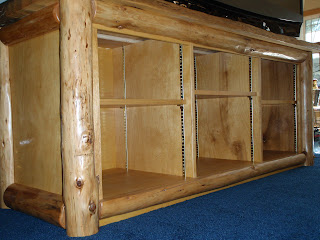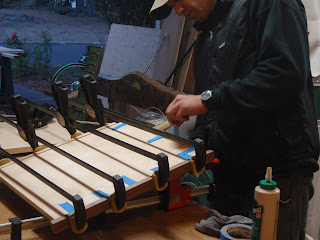After a week of studying for midterms, I was eager to get back to work. I took the pine slab top to Mark at Creative Furniture Designs here in Bend. Mark has an overhead wide belt sander that can handle 48" wide planks. I was guessing it would take him about 15 or 20 minutes to get the slab dead-flat, where as it would take me 3 days of hand planing and sanding to have only a mostly flat surface. After 50 passes and an hour later, Mark had it looking good. I WAY underestimated that one!
Here's the slab, fresh back from the widebelt sander.
Adding a little texture to the top with a wide belt sander, to give the look and feel of a rustic milled board 50 years older than it is.

I had read about these new sanding disks, made of stainless steel, that attach to a random orbit sander. They're supposed to replace something like 5 times the amount of normal sanding pads you use. After only 5 minutes of use, I decided they are garbage.
Here's how one looks installed, with another next to it showing the velcro mounting setup on the back. They don't stick to the base of my sander very well, and have a tendency to shoot off during use. If I can find the receipt, they're going back to the hardware store today.

To match the cabinet base, I wanted to stick with Danish oil finish on the slab as well. Oils can be problematic with soft woods such as pine, so I took the extra step of prefinishing with a clear coat before wiping on the matching oil finish. After about 10 minutes, I came back and found the oil had still managed to blotch up. This is caused by different areas absorbing more of the pigment than others, and makes a "spotty" looking finish.
You can't see the blotching as bad from further away, but I still know it's there. I let the finish dry thoroughly for a day so it doesn't ruin the sanding belts, and today I'll be removing it all with the belt sander. Then, back to the beginning and refinishing with a primary wash coat of shellac.
Hopefully by tonight I'll have a new finish drying on things.
**7pm Update:
Belt sanding the old finish off.
After belt sanding from 50 grit, 80, then 120, I switched to the palm sander. I started again at 120 and went down to 220. I had to remove a good deal of material to get down to where the finish hadn't soaked through.
I gave the whole top 2 healthy coats of wood conditioner, wiped off the excess, then poured some stain into a finish cup.
After waiting 2 hours, I applied the second coat of stain to ensure an even coat. You can start to see the finish really bring out the color here. It was a pain in the butt, but I'm really glad I decided to refinish this piece.
Wiping off the excess stain. While that cures over the next 2 days, I'll be milling an installing face frame material to help shore up the cabinet, cutting a profile in the shelves, drilling holes for wires, cutting the log details, and doing some glue up and finishing.

























































